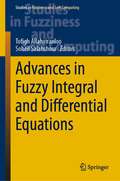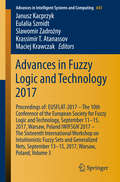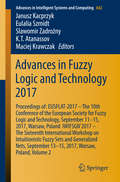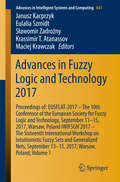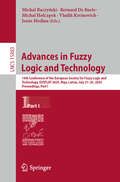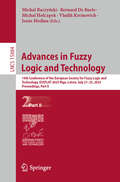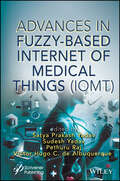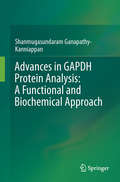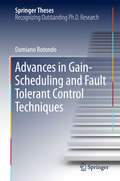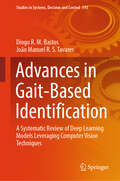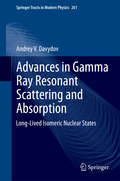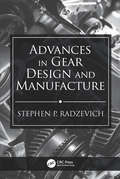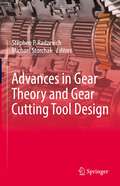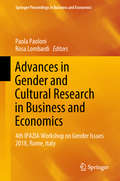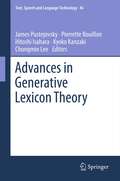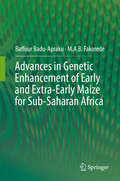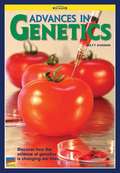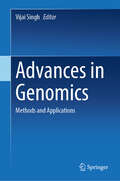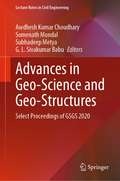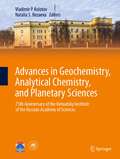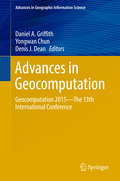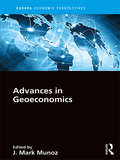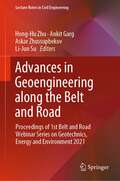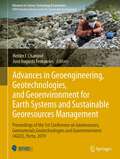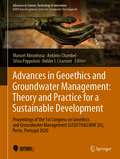- Table View
- List View
Advances in Fuzzy Integral and Differential Equations (Studies in Fuzziness and Soft Computing #412)
by Tofigh Allahviranloo Soheil SalahshourAs the title of the book suggests, the topics of this book are organized into two parts. The first part points out the fuzzy differential equations and the second one is related to the fuzzy integral equations. The book contains nine chapters that six chapters are about fuzzy differential equations and three of them are about fuzzy integral equations. In each part, the chapters’ authors are going to discuss the topics theoretically and numerically.All researchers and students in the field of mathematical, computer, and also engineering sciences can benefit from the subjects of the book.
Advances in Fuzzy Logic and Technology 2017: Proceedings of: EUSFLAT- 2017 – The 10th Conference of the European Society for Fuzzy Logic and Technology, September 11-15, 2017, Warsaw, Poland IWIFSGN’2017 – The Sixteenth International Workshop on Intuitionistic Fuzzy Sets and Generalized Nets, September 13-15, 2017, Warsaw, Poland, Volume 3 (Advances in Intelligent Systems and Computing #643)
by Krassimir T. Atanassov Janusz Kacprzyk Maciej Krawczak Eulalia Szmidt Slawomir ZadrożnyThis volume constitutes the proceedings of two collocated international conferences: EUSFLAT-2017 - the 10th edition of the flagship Conference of the European Society for Fuzzy Logic and Technology held in Warsaw, Poland, on September 11-15, 2017, and IWIFSGN'2017 - The Sixteenth International Workshop on Intuitionistic Fuzzy Sets and Generalized Nets, held in Warsaw on September 13-15, 2017. The conferences were organized by the Systems Research Institute, Polish Academy of Sciences, Department IV of Engineering Sciences, Polish Academy of Sciences, and the Polish Operational and Systems Research Society in collaboration with the European Society for Fuzzy Logic and Technology (EUSFLAT), the Bulgarian Academy of Sciences and various European universities. The aim of the EUSFLAT-2017 was to bring together theoreticians and practitioners working on fuzzy logic, fuzzy systems, soft computing and related areas and to provide a platform for exchanging ideas and discussing the l atest trends and ideas, while the aim of IWIFSGN'2017 was to discuss new developments in extensions of the concept of a fuzzy set, such as an intuitionistic fuzzy set, as well as other concepts, like that of a generalized net. The papers included, written by leading international experts, as well as the special sessions and panel discussions contribute to the development the field, strengthen collaborations and intensify networking.
Advances in Fuzzy Logic and Technology 2017: Proceedings of: EUSFLAT- 2017 – The 10th Conference of the European Society for Fuzzy Logic and Technology, September 11-15, 2017, Warsaw, Poland IWIFSGN’2017 – The Sixteenth International Workshop on Intuitionistic Fuzzy Sets and Generalized Nets, September 13-15, 2017, Warsaw, Poland, Volume 2 (Advances in Intelligent Systems and Computing #642)
by Janusz Kacprzyk Maciej Krawczak Eulalia Szmidt Slawomir Zadrożny K. T. AtanassovThis volume constitutes the proceedings of two collocated international conferences: EUSFLAT-2017 - the 10th edition of the flagship Conference of the European Society for Fuzzy Logic and Technology held in Warsaw, Poland, on September 11-15, 2017, and IWIFSGN'2017 - The Sixteenth International Workshop on Intuitionistic Fuzzy Sets and Generalized Nets, held in Warsaw on September 13-15, 2017. The conferences were organized by the Systems Research Institute, Polish Academy of Sciences, Department IV of Engineering Sciences, Polish Academy of Sciences, and the Polish Operational and Systems Research Society in collaboration with the European Society for Fuzzy Logic and Technology (EUSFLAT), the Bulgarian Academy of Sciences and various European universities. The aim of the EUSFLAT-2017 was to bring together theoreticians and practitioners working on fuzzy logic, fuzzy systems, soft computing and related areas and to provide a platform for exchanging ideas and discussing the l atest trends and ideas, while the aim of IWIFSGN'2017 was to discuss new developments in extensions of the concept of a fuzzy set, such as an intuitionistic fuzzy set, as well as other concepts, like that of a generalized net. The papers included, written by leading international experts, as well as the special sessions and panel discussions contribute to the development the field, strengthen collaborations and intensify networking.
Advances in Fuzzy Logic and Technology 2017: Proceedings of: EUSFLAT-2017 – The 10th Conference of the European Society for Fuzzy Logic and Technology, September 11–15, 2017, Warsaw, Poland IWIFSGN’2017 – The Sixteenth International Workshop on Intuitionistic Fuzzy Sets and Generalized Nets, September 13–15, 2017, Warsaw, Poland, Volume 1 (Advances in Intelligent Systems and Computing #641)
by Krassimir T. Atanassov Janusz Kacprzyk Sławomir Zadrożny Maciej Krawczak Eulalia SzmidtThis volume constitutes the proceedings of two collocated international conferences: EUSFLAT-2017 - the 10th edition of the flagship Conference of the European Society for Fuzzy Logic and Technology held in Warsaw, Poland, on September 11-15, 2017, and IWIFSGN'2017 - The Sixteenth International Workshop on Intuitionistic Fuzzy Sets and Generalized Nets, held in Warsaw on September 13-15, 2017. The conferences were organized by the Systems Research Institute, Polish Academy of Sciences, Department IV of Engineering Sciences, Polish Academy of Sciences, and the Polish Operational and Systems Research Society in collaboration with the European Society for Fuzzy Logic and Technology (EUSFLAT), the Bulgarian Academy of Sciences and various European universities. The aim of the EUSFLAT-2017 was to bring together theoreticians and practitioners working on fuzzy logic, fuzzy systems, soft computing and related areas and to provide a platform for exchanging ideas and discussing the l atest trends and ideas, while the aim of IWIFSGN'2017 was to discuss new developments in extensions of the concept of a fuzzy set, such as an intuitionistic fuzzy set, as well as other concepts, like that of a generalized net. The papers included, written by leading international experts, as well as the special sessions and panel discussions contribute to the development the field, strengthen collaborations and intensify networking.
Advances in Fuzzy Logic and Technology: 14th Conference of the European Society for Fuzzy Logic and Technology, EUSFLAT 2025, Riga, Latvia, July 21–25, 2025, Proceedings, Part I (Lecture Notes in Computer Science #15883)
by Vladik Kreinovich Bernard De Baets Jesús Medina Michał Baczyński Michal HolčapekThis two-volume set LNCS 15883-15884 constitutes the proceedings of the 14th Conference of the European Society for Fuzzy Logic and Technology, EUSFLAT 2025, held in Riga, Latvia, during July 21–25, 2025.The 45 full papers and 8 short papers presented in this book were carefully reviewed and selected from 60 submissions. The papers are divided into special sessions on: fuzzy relations and applications; fuzzy transforms; generalized quantifiers, logical syllogisms and applications; fuzzy entropy; fuzzy metric spaces and their generalizations; information fusion techniques; mathematical fuzzy logic; modeling complex dynamics: adapting analytical tools for diverse scenarios; new contexts in aggregation theory; representing and managing uncertainty; soft methods in statistical inference and data analysis; type 2 fuzzy sets; and advancements and applications of fuzzy theory.
Advances in Fuzzy Logic and Technology: 14th Conference of the European Society for Fuzzy Logic and Technology, EUSFLAT 2025, Riga, Latvia, July 21–25, 2025, Proceedings, Part II (Lecture Notes in Computer Science #15884)
by Vladik Kreinovich Bernard De Baets Jesús Medina Michał Baczyński Michal HolčapekThis two-volume set LNCS 15883-15884 constitutes the proceedings of the 14th Conference of the European Society for Fuzzy Logic and Technology, EUSFLAT 2025, held in Riga, Latvia, during July 21–25, 2025.The 45 full papers and 8 short papers presented in this book were carefully reviewed and selected from 60 submissions. The papers are divided into special sessions on: fuzzy relations and applications; fuzzy transforms; generalized quantifiers, logical syllogisms and applications; fuzzy entropy; fuzzy metric spaces and their generalizations; information fusion techniques; mathematical fuzzy logic; modeling complex dynamics: adapting analytical tools for diverse scenarios; new contexts in aggregation theory; representing and managing uncertainty; soft methods in statistical inference and data analysis; type 2 fuzzy sets; and advancements and applications of fuzzy theory.
Advances in Fuzzy-Based Internet of Medical Things (IoMT)
by Pethuru Raj Chelliah Victor Hugo C. de Albuquerque Satya Prakash Yadav Sudesh YadavADVANCES IN FUZZY-BASED INTERNET OF MEDICAL THINGS (IOMT) This book explores the latest trends, transitions, and advancements of the Internet of Medical Things whose integration through cloud-hosted software applications adds required intelligence from tools such as medical instruments, scanners, and appliances, enabling fuzzy logic to help medical professionals establish linguistic concepts in deciding diagnosis and prognosis. The main goal of the book is to strengthen medical professionals and caregivers by providing methods for achieving fuzzy logic-based health diagnosis and medication. The health condition and various physical parameters of humans, such as heartbeat rate, sugar level, blood pressure, temperature, and oxygen quality, are captured through a host of multifaceted sensors. Additionally, remote health monitoring, medication, and management are being facilitated through a host of ingestible sensors, 5G communication, networked embedded systems, AI models running on cloud servers and edge devices, etc. Furthermore, chronic disease management is another vital domain getting increased attention. The distinct advancements in the fuzzy logic field are useful in various advanced medical care functionalities and facilities. The readers will discover: new and innovative features of health care by using fuzzy logic that raises economic efficiency at macro and micro levels; expounds on fuzzy logic techniques used in medical science; describes the evolution of the fuzzy logic paradigm and how it helps physicians decide on diagnosis and prognosis; uncovers how trust management is dealt with between patients and medical officials to help advance the fuzzy logic field; provides case studies, various technology advancements, and practical aspects on the impacts and challenges of fuzzy-based Internet of Medical Things. Audience The book will be read and used by researchers in artificial intelligence, fuzzy logic, medical professionals, caregivers, health administrators, and policymakers.
Advances in GAPDH Protein Analysis: A Functional and Biochemical Approach
by Shanmugasundaram Ganapathy-KanniappanThis book presents modern and classic analytical approaches that are crucial for the biochemical and functional characterization of the archetypal protein, glyceraldehyde-3-phosphate dehydrogenase (GAPDH). The distinguishing feature of the book is that it covers, in addition to other methods, some of the uncommon but valuable techniques as well. For example, in-gel visualization of enzyme activity, immunoblotting protocols for native (non-denatured) proteins, and proteins resolved by pH-gradient [IEF-isoelectrofocusing], etc. These expedient methods are relevant and vital for the verification of biochemical properties of GAPDH, or similar protein of interest. This work outlines detailed protocols that are essential to investigate classical (cellular) and recently reported extracellular (secretory) isoforms of GAPDH. Precisely, the book covers techniques pertinent to enzymatic and non-enzymatic analysis of GAPDH that include, but not limited to, electrophoretic mobility shift assay (EMSA), two-dimensional (2D)-immunoblotting, immunofluorescence/confocal microscopy, mass spectrometry, ion-exchange and affinity chromatography. Readers will discover the importance of the experimental methods described in the book as they relate to the evaluation of the role and significance of GAPDH. Furthermore, majority of the methods described in the book have also been validated in the author's laboratory, besides other research groups worldwide, underlining the repeatability and reproducibility of the protocols. Each method begins with an abstract and a brief background emphasizing its application and relevance. This will enable the readers to determine the choice of experimental design according to their research objectives. The book explains the methods systematically with ample illustrations to facilitate quick and easy comprehension of the practical knowledge. Although the book is focused on GAPDH, many of the protocols may be adopted to other proteins or enzymes with minimal modifications. Noteworthy, it is unequivocally established that GAPDH is a multifunctional protein involved in several cellular processes of health & disease conditions. Hence, this book will be a valuable practical guide for young researchers, scientists and clinician-scientists.
Advances in Gain-Scheduling and Fault Tolerant Control Techniques (Springer Theses)
by Damiano RotondoThis thesis reports on novel methods for gain-scheduling and fault tolerant control (FTC). It begins by analyzing the connection between the linear parameter varying (LPV) and Takagi-Sugeno (TS) paradigms. This is then followed by a detailed description of the design of robust and shifting state-feedback controllers for these systems. Furthermore, it presents two approaches to fault-tolerant control: the first is based on a robust polytopic controller design, while the second involves a reconfiguration of the reference model and the addition of virtual actuators into the loop. Inaddition the thesis offers a thorough review of the state-of-the art in gain scheduling and fault-tolerant control, with a special emphasis on LPV and TS systems.
Advances in Gait-Based Identification: A Systematic Review of Deep Learning Models Leveraging Computer Vision Techniques (Studies in Systems, Decision and Control #593)
by João Manuel R. S. Tavares Diogo R. BastosThis book provides a systematic review of gait-based person identification, categorizing studies into deep-learning and non-deep-learning approaches while analyzing key datasets and performance metrics. It explores challenges such as covariant factors, e.g., viewing angles, clothing, and accessories, and highlights advancements in real-world gait recognition systems. With a structured methodology and transparent review process, this work serves as a valuable reference for researchers and a foundation for future developments in biometric identification.
Advances in Gamma Ray Resonant Scattering and Absorption: Long-Lived Isomeric Nuclear States (Springer Tracts in Modern Physics #261)
by Andrey V. DavydovThis book presents the basics and advanced topics of research of gamma ray physics. It describes measuring of Fermi surfaces with gamma resonance spectroscopy and the theory of angular distributions of resonantly scattered gamma rays. The dependence of excited-nuclei average lifetime on the shape of the exciting-radiation spectrum and electron binding energies in the spectra of scattered gamma rays is described. Resonant excitation by gamma rays of nuclear isomeric states with long lifetime leads to the emission and absorption lines. In the book, a new gamma spectroscopic method, gravitational gamma spectrometry, is developed. It has a resolution hundred million times higher than the usual Mössbauer spectrometer. Another important topic of this book is resonant scattering of annihilation quanta by nuclei with excited states in connection with positron annihilation. The application of the methods described is to explain the phenomenon of Coulomb fragmentation of gamma-source molecules and resonant scattering of annihilation quanta to study the shape of Fermi surfaces of metals.
Advances in Gear Design and Manufacture
by Stephen P. RadzevichAdvances in Gear Design and Manufacture deals with gears, gear transmissions, and advanced methods of gear production.The book is focused on discussion of the latest discoveries and accomplishments in gear design and production, with chapters written by international experts in the field. Topics are aligned to meet the requirements of the modern scientific theory of gearing, providing readers precise knowledge and recommendations on how perfect gears and gear transmissions can be designed and produced, and how they work. It explains how gears and gear transmissions can be designed to reach high a “power-to-weight” ratio, and how to design and produce compact, high-capacity gearboxes.
Advances in Gear Theory and Gear Cutting Tool Design
by Stephen P. Radzevich Michael StorchakThis book was written by a team of leading gear experts from across the globe, including contributions from USA, Germany, Poland, China, Russia, Ukraine, and Belarus. It provides readers with the latest accomplishments in the gear theory and gear cutting tool design. Specialists can apply competencies gained from this book to quality control in gear manufacture, as well as to the conditions of their production. The book begins with a detailed discussion of the kinematics and geometry of geometrically-accurate gears and gear systems. This is followed by an analysis of state-of-the-art gear manufacturing methods with focus on gear finishing operations. Novel designs of gear transmission systems as well as gear theory and gear cutting tool design are also covered.
Advances in Gender and Cultural Research in Business and Economics: 4th Ipazia Workshop On Gender Issues 2018, Rome, Italy (Springer Proceedings in Business and Economics)
by Rosa Lombardi Paola PaoloniThis volume presents current research on gender and culture from business, management and accounting perspectives with a multidisciplinary approach. Featuring selected contributions presented at the 4th IPAZIA Workshop on Gender Studies held at Niccolò Cusano University in Rome, Italy, this book investigates gender strategies adopted and tested by various companies and assesses the impact of their subsequent dissemination. The contents are structured into four sections each of which addressing a specific theme on gender studies as follows: I) Women in Academia and in the University contexts: A trans-disciplinary approach; II) Gender issues, Corporate Social Responsibility and reporting; III) Woman in business and female entrepreneurship; IV) Women in Family Business. The result is a book that provides an innovative and rigorous analysis of gender issues proposing new challenges and insights in gender studies. IPAZIA Scientific Observatory for Gender Studies defines an updated framework of research, services, and projects, all initiatives related to women and gender relations at the local, national and international. In order to achieve this objective, the Observatory aims to implement the literature on gender studies, to organize and promote scientific significant initiatives (workshops, seminars, conferences, studies, scientific laboratory) on these issues at the national and international level under an interdisciplinary perspective.
Advances in Generative Lexicon Theory (Text, Speech and Language Technology #46)
by James Pustejovsky Pierrette Bouillon Kyoko Kanzaki Chungmin Lee Hitoshi IsaharaThis collection of papers takes linguists to the leading edge of techniques in generative lexicon theory, the linguistic composition methodology that arose from the imperative to provide a compositional semantics for the contextual modifications in meaning that emerge in real linguistic usage. Today's growing shift towards distributed compositional analyses evinces the applicability of GL theory, and the contributions to this volume, presented at three international workshops (GL-2003, GL-2005 and GL-2007) address the relationship between compositionality in language and the mechanisms of selection in grammar that are necessary to maintain this property. The core unresolved issues in compositionality, relating to the interpretation of context and the mechanisms of selection, are treated from varying perspectives within GL theory, including its basic theoretical mechanisms and its analytical viewpoint on linguistic phenomena.
Advances in Genetic Enhancement of Early and Extra-Early Maize for Sub-Saharan Africa
by Baffour Badu-Apraku M. A. B. FakoredeThe book focuses on the principles and practices of tropical maize improvement with special emphasis on early and extra-early maize to feed the increasing population in Sub-Saharan Africa. It highlights the similarities and differences between results obtained in temperate regions of the world and WCA in terms of corroboration or refutation of genetic principles and theory of maize breeding. The book is expected to be of great interest to maize breeders, advanced undergraduates, graduate students, professors and research scientists in the national and international research institutes all over the world, particularly Sub-Saharan Africa. It will also serve as a useful reference for agricultural extension and technology transfer systems, Non-governmental Organizations (NGOs) and Community-Based Organizations (CBOs), seed companies and community-based seed enterprises, policy makers, and all those who are interested in generating wealth from agriculture and alleviating hunger and poverty in Sub-Saharan Africa.
Advances in Genetics
by Matt DoedenLearn about the fast-moving science of genetics and the far-reaching consequences of new advances in this scientific field.
Advances in Genomics: Methods and Applications
by Vijai SinghThis book provides a comprehensive overview of genomics and its diverse applications. Chapters cover genomics data generation methods, computational tools, gene annotation, transcriptomics, DNA barcoding, next-generation sequencing, functional genomics, metagenomics, synthetic genomics, microarray analysis, nutrigenomics, genome editing, and more. This book offers a valuable source of information for not only beginners in genomics, but also for students, researchers, scientists, clinicians, practitioners, policymakers, and stakeholders who are interested in harnessing the potential of genomics in many areas.
Advances in Geo-Science and Geo-Structures: Select Proceedings of GSGS 2020 (Lecture Notes in Civil Engineering #154)
by G. L. Sivakumar Babu Subhadeep Metya Awdhesh Kumar Choudhary Somenath MondalThis book presents select proceedings of the National conference on Geo-Science and Geo-Structures (GSGS 2020). It provides sustainable solutions to various challenges encountered in the field of geotechnical engineering. The topics presented include advanced characterization to study the behavior of geomaterials, shallow and deep foundations including tunneling, use of geosynthetics and other soil reinforcing materials in minimizing slope failures and landslides, dynamics of soils and foundations, and its connection with energy geotechnics, transportation geotechnics, and offshore geotechnics. The book further highlights various aspects of ground improvement techniques by incorporating the use of industrial by-products, forensic analyses of geo-structures, instrumentation and sensing techniques in geotechnical engineering and issues associated with geo-environmental engineering. The book will be a valuable reference for budding researchers, academicians, practitioners and policymakers interested in sustainable practices associated with geotechnical engineering and related domains.
Advances in Geochemistry, Analytical Chemistry, and Planetary Sciences: 75th Anniversary of the Vernadsky Institute of the Russian Academy of Sciences
by Vladimir P. Kolotov Natalia S. BezaevaThis book presents 41 selected articles written by leading researchers from the Vernadsky Institute of Geochemistry and Analytical Chemistry, part of the Russian Academy of Sciences. The articles are grouped by the following topics: (1) Geochemistry, (2) Meteoritics, Cosmochemistry, Lunar and Planetary Sciences, (3) Biogeochemistry and Ecology, and (4) Analytical Chemistry, Radiochemistry, and Radioecology. The articles present recent experimental data, theoretical investigations, critical reviews, the results of computer modeling in the above-mentioned fields.Intended to provide a scientific “snapshot” of the institute, the book also includes content on its history, main scientific achievements and current goals, together with detailed descriptions of its 25 laboratories and three museums so as to promote new international collaborations.Given its scope, the book will be of interest to all scientists and graduate students working in the areas of geochemistry, analytical chemistry and radiochemistry, earth and environmental sciences, biogeosciences, meteoritics and planetary science, and to those seeking new collaboration opportunities in these areas in Russia.
Advances in Geocomputation: Geocomputation 2015--The 13th International Conference (Advances in Geographic Information Science)
by Daniel A. Griffith Yongwan Chun Denis J. DeanThis book contains refereed papers from the 13th International Conference on GeoComputation held at the University of Texas, Dallas, May 20-23, 2015. Since 1996, the members of the GeoComputation (the art and science of solving complex spatial problems with computers) community have joined together to develop a series of conferences in the United Kingdom, New Zealand, Australia, Ireland and the United States of America. The conference encourages diverse topics related to novel methodologies and technologies to enrich the future development of GeoComputation research.
Advances in Geoeconomics (Europa Economic Perspectives)
by J Mark MunozWhile geopolitics has captured global attention, geoeconomics is the often hidden force that governs countries’ relationships. It is the economic psyche that shapes the new world order. Geoeconomics refers to the intersection of economic factors, relationships and conditions on global events. A country’s political and business alignments have an impact on individuals, companies and on future economic stability. This book assembles leading scholars and experts from around the world to advance current thinking on geoeconomics. It is a thorough and authoritative reference work on world economics that aims to shape strategy formulation in business and government for years to come by expanding understanding on the topic of geoeconomics, analyzing the implications of international geoeconomic events, and providing the reader with theoretical and practical approaches on the management of geoeconomics. Geoeconomic concepts in this book will prove timely and highly insightful to students, academics, executives, entrepreneurs, government officials, consultants and policymakers.
Advances in Geoengineering along the Belt and Road: Proceedings of 1st Belt and Road Webinar Series on Geotechnics, Energy and Environment 2021 (Lecture Notes in Civil Engineering #230)
by Ankit Garg Askar Zhussupbekov Hong-Hu Zhu Li-Jun SuThis book is a compilation of selected papers from the 1st Belt and Road Webinar Series on Geotechnics, Energy and Environment, March - May 2021. The book comprises selected research related to advances in geo-environmental engineering. Topics covered include rock mechanics, sustainable materials, frozen soils, geotechnical innovations in megacities. The research is related to the sustainable infrastructure development for countries in China's Belt and Road Initiative. The contents of the volume will prove useful to researchers and professionals working in geotechnical and geological engineering domains.
Advances in Geoengineering, Geotechnologies, and Geoenvironment for Earth Systems and Sustainable Georesources Management: Proceedings of the 1st Conference on Georesources, Geomaterials, Geotechnologies and Geoenvironment (4GEO), Porto, 2019 (Advances in Science, Technology & Innovation)
by Helder I. Chaminé José Augusto FernandesThis book comprises the peer-reviewed proceedings of the 1st Conference on Georesources, Geomaterials, Geotechnologies and Geoenvironment (4GEO), Porto, Portugal, on November 7–8, 2019. The book interests all researchers, practitioners, and students in engineering geosciences, geotechnics, georesources, materials engineering, and earth and environmental sciences.Georesources, geomaterials, geotechnologies, and geoenvironment are very topical subjects and therefore deserve a deeper reflection by academia, practitioners, and society. That approach is vital to a correct sustainable resource management and an engineering design with nature within a geoethical framework. Georesources, understood as geological, hydrological and energetic resources are greatly important to society. Minerals, rocks, and water are resources that, over time, have assumed an important role in the technological development of communities. Given the increase in population and the increasing needs and intensification of their use, it is very important to ensure their sustainable management. Geomaterials are functional geological materials artificially processed for the generality of the activities developed by societies. The functional geomaterials may include rock, clay, granular materials, treated soils, and industrial waste. Geotechnologies are a very important tool for decision-making, supporting the collection, mapping, processing, and analysis of data with geographical information systems and other geo-techniques used in the most diverse fields, including to support the monitoring and prediction of geohazards. The geoenvironment is a transversal field that identifies continuous earth changes and to find solutions to the resulting socioeconomic and environmental changes. Climate change, industrialization, and anthropic activity are, among others, factors of pressure and alteration of the natural environment, so minimizing impacts and emerging hazards and risks.Main topics include:1. Geomaterials, Geotechnics, and Georesources2. Geotechnologies, Engineering Geosciences, and Geohazards3. Geoenvironment, Water, and Climate Change
Advances in Geoethics and Groundwater Management: Proceedings of the 1st Congress on Geoethics and Groundwater Management (GEOETH&GWM'20), Porto, Portugal 2020 (Advances in Science, Technology & Innovation)
by Silvia Peppoloni Helder I. Chaminé Manuel Abrunhosa António ChambelThis book gathers the peer-reviewed proceedings of the 1st congress on Geoethics & Groundwater Management (GEOETH&GWM'20), held in Porto, Portugal, in an online format on 18-22 May 2020. Hosted in School of Engineering (ISEP), Polytechnic of Porto based on Porto city (a UNESCO World Heritage Site), the international conference focused on what has now been dubbed “hydrogeoethics”, a novel transdisciplinary, scientific field integrating all dimensions of geoethics in groundwater science and practice. Given its scope, the book is of interest to all researchers and practitioners in the geosciences, hydrology, water resources, hydrogeology, natural resources management, environment, engineering, law, sociology, education, philosophy, culture, among others.This joint congress is the result of a collaborative agreement between the IAH (International Association of Hydrogeologists) and IAPG (International Association for Promoting Geoethics) and reflects the need for concerted actions to achieve sustainable development.The diversity, scale, significance and increasing magnitude of anthropogenic interactions with aquifers and groundwater, which often involve conflicting values or interests, call for analysis, discussions and decisions on the part of the agents involved, e.g. groundwater scientists, policymakers, managers, organisations, professionals and citizens. This approach calls for a responsible, sustainable and human approach to groundwater use and management.The groundwater community involved in the exploration and exploitation, use and management of this increasingly vital natural resource is becoming more and more aware that ethical issues pervade all our attitudes from concept to action and need to be addressed. Diverse values and cultures, science and education, law and policies, human and natural environments and the public and the economic sectors view groundwater and its value and/or role differently. The authors believe that in a globalised and interconnected world, common ground must be found in the interest of peace, human development and sustainability. The main topics covered here include:1. Fundamentals of hydrogeoethics: cultures, principles and geoethical values on groundwater science and engineering2. Lessons for a resilient and sustainable future with hydrogeoethics: case studies of geoethics in groundwater science-engineering, profession, and management3. Scientific and humanistic components of hydrogeoethics in groundwater education and professional training 4. Socio-hydrogeology and ethical groundwater management 5. Geoethics of decision making under uncertainty and ethical issues in neglecting groundwater functioning 6. Groundwater: geological, legal, social, and ethical challenges of a unique natural resource
